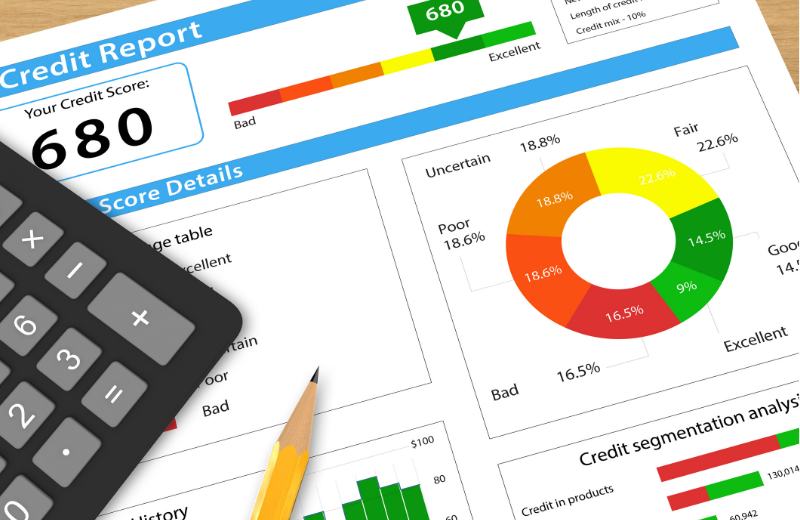Whether you need to borrow money for a car, a house, or even a personal loan, your credit score largely determines whether you can get a loan and how much interest you pay. A higher credit score not only increases your chances of getting a loan but also helps you get better loan terms, which can save you money in the long run. It’s important to remember that your credit score changes over time. With smart strategies and good habits, you can improve your credit score before applying for a loan. This guide shows you how to do this in simple, practical steps.
Understand the factors that determine your credit score
Before you try to improve your credit score, it’s important to understand this. Most credit scoring models assess your credit score based on five key factors:
- Payment history: The most important is your on-time payments.
- Credit utilization indicates how much of your potential credit limit you’re currently using.
- Length of your credit history: The more accounts you have, the better.
- Credit mix: A history of different types of credit (loans, credit cards, etc.) indicates that you can manage various types of accounts well.
- New credit history: Applying for too many accounts at once can lower your credit score. With this insight, you can focus on the areas that need the most improvement.
Pay your bills on time
Your payment history is the most important factor in your credit score, so the best way to improve it is to pay your bills on time every month. Even missing one payment can significantly lower your credit score. If you have trouble remembering due dates, set reminders or schedule regular payments. This will help you avoid late fees and negative credit reports.
Pay down your credit card balances
Excessive credit card debt increases your credit utilization ratio, which is detrimental to your credit score. You should aim to use less than 30% of your available cash, and even less is better if possible. For example, if your credit limit is $10,000, try to keep your debt under $3,000. Paying off debt not only improves your credit score but also makes lenders think you’re more careful with your finances.
Don’t open too many new accounts
You might be tempted to apply for more credit cards to get more credit, but applying too soon can damage your credit score. When you apply for a credit loan, lenders perform a strict check, which can temporarily lower your credit score. Therefore, take good care of your existing accounts before opening a new one.
There could be errors on your credit report
Errors on your credit report are more common than you think and can negatively impact your credit score for no apparent reason. You can request a free credit report annually from the three major credit bureaus (Equifax, Experian, and TransUnion). Review your report carefully and question any errors you find, such as incorrect late payments or accounts that don’t belong to you. Correcting these errors will quickly improve your credit score.
Maintain old accounts
Closing credit cards you no longer use can be a good idea, but it can impact your credit score. Closing old accounts shortens your credit history and lowers your available credit limit, which can lead to an increase in your credit utilization ratio. Maintaining old accounts helps build your credit history, provided the card doesn’t have high fees or other issues.
Diversify your credit
Lenders want to know if you can safely handle different types of loans. If you only have a credit card, you can add a secured loan or a small personal loan to your credit mix to improve your credit profile. However, you shouldn’t take on new debt just to be different. Do so only if it will benefit your financial situation.
Pay off your debt wisely
If you have a lot of debt, you can reduce your bills faster by paying off your smallest debts first (snowball debt) or the highest-interest debts first (avalanche debt). This not only lowers your credit limit, which improves your credit score, but also allows you to make fewer payments at a time, reducing your financial burden.
Continue working hard and being patient
You can’t expect your credit score to improve quickly. It takes time, focus, and perseverance. Maintaining good financial habits will improve your credit score over time, even if it doesn’t improve immediately. Remember that lenders strive for
FAQS
If I check my credit score, will it go down?
Checking it yourself doesn’t affect your credit score; this is called a “soft inquiry.” Only lenders can temporarily lower your credit score.
Should I hire a company to repair my credit?
Following the steps above can often help you achieve a better credit score. Credit repair companies often charge high fees for tasks you can do yourself, such as correcting errors.
In summary
If you have a good credit history, you may qualify for a high-quality loan with lower interest rates and greater financial freedom. You can slowly improve your credit score by paying bills on time, paying down debt, keeping old accounts open, and not applying for new credit when unnecessary. This work is worthwhile, especially before applying for a loan, although it does take time and effort. Taking the time to improve your credit increases your chances of approval. It can also save you money in the long run, allowing you to confidently achieve your financial goals.




